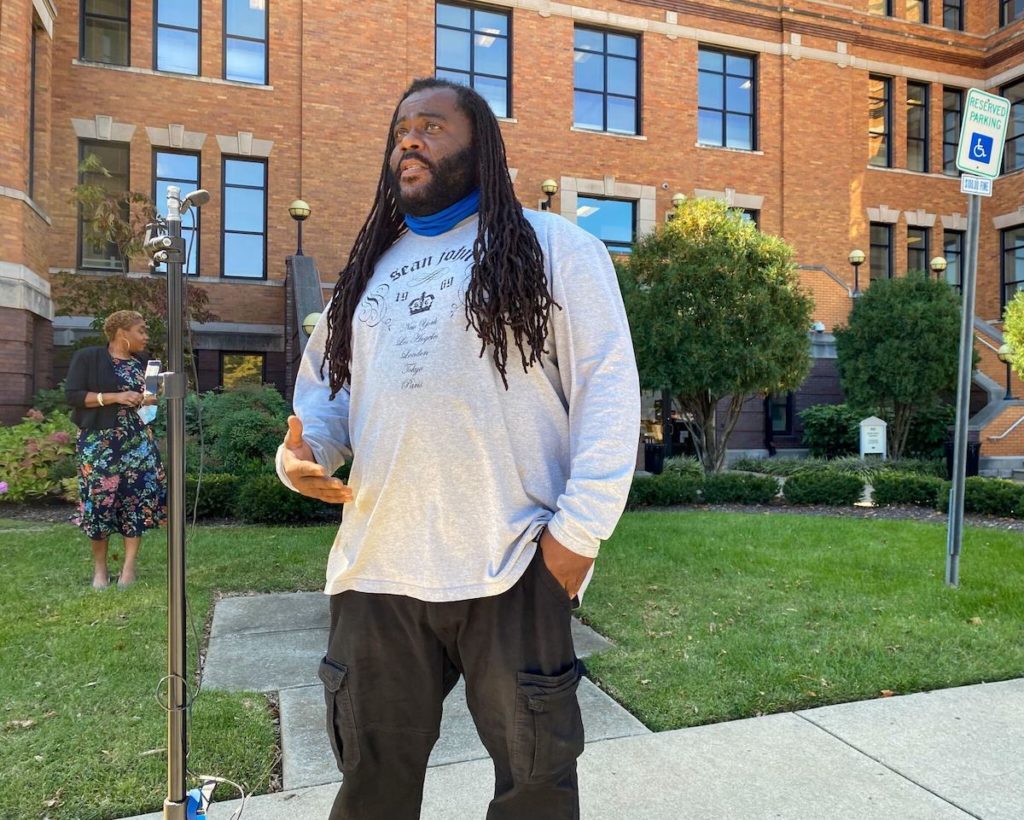
After two years of paperwork and phone calls and visits to countless government buildings, Milton Thomas was about ready to give up.
But outside the Davidson County Election Commission Monday, Thomas was all smiles. A local nonprofit had paid off his court debt, just in time for the deadline to register to vote.
“It’s just a beautiful thing, because I never thought that I would vote again. Like, in life,” Thomas said. “I made a couple of bad decisions, and it still was holding over my head, why I couldn’t vote. I had no say-so in anything that goes on in the world. So, now I feel like that’s the last nail in the coffin, because I need to put all the past behind and move forward to a future.”
Thomas is one of the first Tennesseans to restore his voting rights with help from the Free Hearts Fines and Fees Fund. The Nashville-based organization led by formerly incarcerated women launched the fund this month, so that unpaid debts won’t block people from the ballot box.
More than 420,000 people across the state won’t be able to vote this November because they’ve been convicted of a felony. And in many cases, the only obstacle in their way is court debt they can’t afford to pay.
More: 100 Years After Tennessee Women Got The Right To Vote, Some Are Still Fighting To Cast Their Ballot
Tennessee is one of just a few states that requires residents with felony convictions to pay their court fines and fees before they can vote. It’s also the only state that prohibits formerly incarcerated individuals who aren’t up to date on child support from voting.
“Being poor, being unable to pay, should not be a prerequisite to not be able to vote,” said Davidson County Criminal Court Clerk Howard Gentry. His office has partnered with Free Hearts, the University of Tennessee College of Social Work and several philanthropists to make it easier for those who can’t afford to pay their court debts to vote.
“We have a lot of things that we do within the criminal justice system that work. But it’s too many that don’t work,” Gentry said. “While it’s that way, I can’t just sit back and act like it’s OK. It’s not OK. We’ve got to be better.”
Court debt is one of many barriers that make it difficult for Tennesseans who have been convicted of a felony to restore their voting rights. The state also requires them to get a certified voting restoration certificate, which often involves coordinating with various government officials to get all the proper forms filled out.
But, even when the paperwork is squared away, paying down a mountain of fines, fees and restitution can be daunting — even impossible for some.
“It’s not cheap,” said Keeda Haynes, senior legal counsel for Free Hearts and former congressional candidate.
Haynes said the fund has paid just a few thousand for its first clients, because some of their outstanding court costs had been waived. But another, she said, owes $25,000.
“This person will never be able to pay $25,000 in court costs,” Haynes said.
Jawharrah Bahar didn’t think she’d ever be able to pay off her court debt, either. As director of outreach for Free Hearts, she’s served as a case study for the organization to learn firsthand just how overwhelming the voter restoration process can be.
Bahar said she had to be adamant, meeting with officials over and over until she got the information she needed. But with three kids to take care of, paying off her restitution seemed unfeasible. And, like Thomas, she almost gave up.
But then Bahar had to sit out one election after the next, and she decided to keep pushing forward. Now, her court debt is resolved and she’s getting ready to vote this fall.
“I’m excited that I finally feel like I’m part of this community, that I’ll be able to vote locally and in the presidential election,” Bahar said. “I just feel like it’s very important for everyone to fight for what we’re doing and let your voices be heard.”
Samantha Max is a Report for America corps member.

